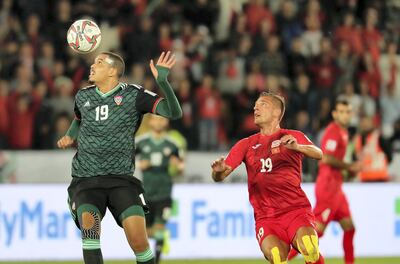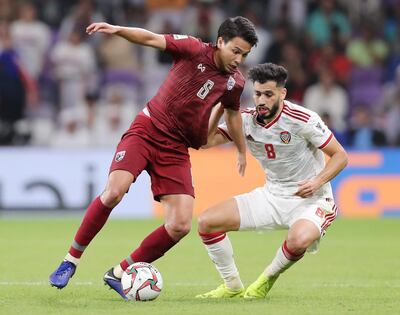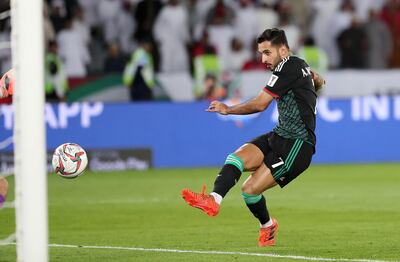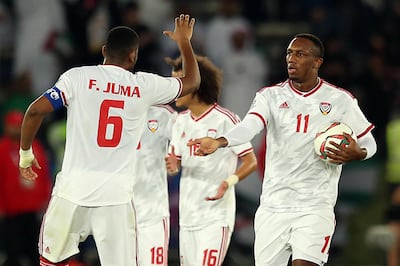Make the most of '50-50' clash
Ismail Matar made the concession, but still he sought positives. The UAE veteran, handed a first start of the tournament against Kyrgyzstan, and the captain’s armband too, admitted the hosts have been poor thus far.
Given a supposedly straightforward run to the quarter-finals, the UAE were expected to defeat Bahrain, India and Thailand in their group, but sealed a solitary victory - a rather fortunate one against India.
In the last 16, Kyrgyzstan pushed them all the way to extra time, and should have forced penalties. Matar, though, expects the UAE to perform better against Australia. A "50-50 game", he suggested, allows his side to play with more freedom, with the pressure lightened.
What’s more, Australia should display more adventure than previous opponents, leaving more space for the UAE to create. It sounds promising, in theory. Whether that works in practice remains to be seen.

Limiting the mistakes a must
It has been a recurring concern. The UAE have given up too many chances to the opposition this tournament, especially against India in the group stages and Thailand, too. They were similarly gracious in Monday's tense tie with Kyrgyzstan.
Speaking earlier, goalkeeper Khalid Essa warned of the need to eradicate mistakes, reminding that, in the knockout stages, one error could end his team's campaign. In all, and contrary to Alberto Zaccheroni’s perceived defensive approach, the UAE have been too loose at the back and lacking in protection in front.
To improve, communication between defenders must be better; their positions more compact. Fares Juma will come in for the injured Khalifa Mubarak, but both he and partner Ismail Ahmed have looked jittery at times.
Also, when right-back Bandar Al Ahbabi marauds forward – potentially a real strength – midfield cover has been found wanting. Australia's Chris Ikonomidis, a standout this tournament, could prosper.

Majed Hassan’s midfield inclusion vital
One of the main criticisms levelled at Zaccheroni has been an apparent defence-first outlook. In three of four matches, the Italian has deployed three defence-minded midfielders: Ali Salmeen, Khamis Esmail and Amer Abdulrahman. Consequently, the UAE have spoiled rather than sparked, leaving striker Ali Mabkhout isolated and widemen Ismail Al Hammadi and Khalfan Mubarak struggling to link the attack.
However, Esmail’s suspension opens the door for Hassan to come back into the centre. The Shabab Al Ahli Dubai midfielder has long been regarded as one of the country’s finest players, but injuries have punctuated his progress.
Hassan is tenacious and technically proficient, and can help control midfield – as he displayed for spells in his one appearance, against Thailand. Another issue, though, is Abdulrahman.
The Al Ain midfielder was once a stalwart, yet he appears a shadow of the player who excelled for years at various age-group levels. A re-think in formation may be required, possibly involving Matar.

Ali Mabkhout to keep on the goal trail
Top scorer at the 2015 Asian Cup, Mabkhout has three goals in four matches this time around. He netted in the dying stages against India to secure the points, then headed home an early opener against Thailand.
On Monday, Mabkhout struck the second against Kyrgyzstan, a fine control and finish that reclaimed the lead and looked to have put the UAE on the path to victory. Yet his record masks a general malaise.
The Al Jazira striker, the leading marksman in this season’s Arabian Gulf League, has been wasteful in front of goal, while his hold-up play, and his touch, has been poor. As mentioned, Zaccheroni’s tactics have not helped: Mabkhout can often appear too detached from those behind him.
Up against the competent Trent Sainsbury, he won’t have an easy night on Friday. The UAE’s hopes could rest on Mabkhout rediscovering his Midas touch.

Ahmed Khalil needs more game-time
Still processing the UAE's narrow escape against Kyrgyzstan, Zaccheroni highlighted his Khalil conundrum. The powerful striker represents "one of the best attackers in Asia", the Italian offered, but getting him on the pitch is a problem.
Khalil, the continent’s player of the year in 2015, has for some time been blighted by injury issues, with his most recent run-out before the Asian Cup back in September. But here’s the rub: Khalil has for some time been his national team’s regular rescue act, a man for the grand occasion.
This tournament, he scored the late equaliser to salvage a point against Bahrain, then again in extra time against Kyrgyzstan. Both were penalties. Yet to start, Khalil has played only 47 of 390 minutes.
Fitness permitting, it’s time to give him more game-time. Especially against a physical Australian side, who will be wary of Khalil’s national-team pedigree. It could help Mabkhout, too: typically, the pair has dovetailed well.


